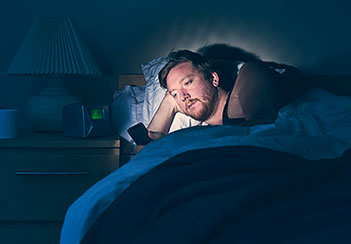
It’s not easy to keep away from your phone these days. It’s a lifeline for staying in touch with family, friends, and the constantly changing state of the world.
But in times like this, an overreliance on your mobile device can tip the balance of your emotional and mental health. Are you more addicted to your phone than usual?
Is your phone disconnecting you from the family and friends around you? Are you using it to stay informed? Or adding to your anxiety and exhaustion by compulsively clicking links? How can you maintain the healthiest relationships and lifestyle possible while in quarantine?
Addicted to Your Phone? Here’s How to Cut Back
Psychologist J. Kim Penberthy, PhD, guides us through some best practices for managing our cell phone use while living under quarantine.
During a time of quarantine, more than ever, we need mobile devices to stay connected. Any guidelines for maintaining healthy phone habits?
If others are complaining about the time you spend on your phone, or it interferes with your connections to real people, think about reducing your usage.
Many smart phones keep records of how much time you spend using them, as well as your usage of social media. Recognition is the first part of healthy usage.
Make a contract with yourself to limit your daily usage. Or hold yourself accountable by making a verbal commitment to a friend or family member. That way, you can think about why you use your phone and focus on essential communication instead of entertainment.
You can also focus on using your phone during certain hours of the day and designate other times as “cell phone free.” This will help get your phone usage back in balance.
Is there a better time to check your phone?
Research by Georgetown Psychology shows that screen time at night is not recommended because it can interfere with your sleep. So using your phone just prior to bedtime is not a good idea.
Any suggestions for ways to stop reaching for a phone in times of boredom, frustration, or anxiety?
Becoming more aware and intentional about cell phone usage can help. This can be thought of as a form of mindfulness, or intentionality. It involves taking a pause before reaching for the phone (or after grabbing it absent-mindedly), and taking a few deep breaths.
Think about your goal:
- Why are you reaching for the phone?
- What are you trying to achieve?
- Are you lonely, bored, sleepy, frustrated, or angry?
Pause, breathe, and check in with yourself. Then think about the most effective way to address this. If you are tired, go to sleep. If you are bored, move around or go for a walk. The point is to slow down the automatic reaction of reaching for your phone and make it more intentional.
Are there any studies on the negative effects of habitual phone usage that we should keep in mind?
Besides the Georgetown Psychology study on nighttime usage, there is an International Journal of Health Sciences study on the health risks associated with mobile phones. You can also find helpful guidelines in this HelpGuide article on smartphone addiction.
Now that children are having to home-school remotely, many parents are relaxing their screen time restrictions. Is there a daily recommended amount of screen time for kids?
The keyword is moderation. There is no recommended number of hours and no golden rule, unfortunately. There are studies that demonstrate the negative effects of increased phone usage. And there are studies that demonstrate the positive effects. Often, it depends on what’s being measured.
Children need face to face human interaction in addition to screen time. A helpful article published in PsychCentral highlights some of the benefits of exposure to technology (quick decision-making, problem-solving, multitasking) and how best to regulate their screen time.

